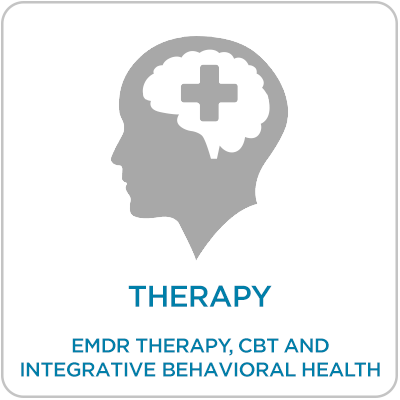EMDR Therapy: A Powerful Tool for Healing Trauma
EMDR therapy is a unique and effective treatment approach that has been proven to help individuals overcome the effects of trauma, anxiety, depression, and other mental health issues. This innovative therapy approach is gaining popularity in the field of psychology, and for good reason.
What is EMDR Therapy?
EMDR (Eye Movement Desensitization and Reprocessing) therapy is a type of psychotherapy that was developed in the late 1980s to help individuals process traumatic memories and experiences. This therapy approach is based on the idea that traumatic experiences can become "stuck" in the brain and body, causing negative thoughts, emotions, and physical sensations. Through EMDR therapy, individuals can work through these traumatic experiences and reprocess them in a way that allows them to heal and move forward.
Benefits of EMDR Therapy
Effective Treatment for Trauma
EMDR therapy has been extensively researched and has been shown to be an effective treatment for individuals who have experienced trauma. This includes individuals who have experienced physical or sexual abuse, combat trauma, natural disasters, and other traumatic experiences.
Reduces Symptoms of Anxiety and Depression
EMDR therapy can also be effective in reducing symptoms of anxiety and depression. Through the processing of traumatic memories, individuals can experience a reduction in negative thoughts and emotions.
Helps with Addiction Recovery
EMDR therapy has also been used to help individuals in addiction recovery. By addressing the underlying trauma that may have contributed to the addiction, individuals can gain a greater understanding of their addiction and develop healthy coping mechanisms.
Improves Self-Esteem
EMDR therapy can also be used to improve self-esteem and self-worth. Through the processing of negative experiences and emotions, individuals can develop a more positive self-image.
Provides Rapid Results
EMDR therapy is often a faster form of therapy compared to other forms like CBT and behavioral health therapy. Some individuals may experience significant improvements after just a few sessions.
Non-Invasive Treatment
EMDR therapy is a non-invasive form of therapy that does not require medication. It is a safe and effective treatment approach that has helped many individuals overcome trauma and other mental health issues.
Customizable Treatment Plan
EMDR therapy can be customized to meet the unique needs of each individual. This means that each treatment plan is tailored to the specific needs of the individual, which can lead to more effective treatment.

We do not believe in only managing a chronic issue, we aim to resolve it.
Dr. Amy Serin
EMDR (Eye Movement Desensitization and Reprocessing) Therapy
EMDR (Eye Movement Desensitization and Reprocessing) therapy is a unique form of therapy that is different from traditional talk therapy. This type of therapy is designed to help people process traumatic or disturbing events and move forward with their lives. Here's a closer look at how EMDR therapy is different.
EMDR therapy focuses on the present
Unlike traditional talk therapy, which may spend a lot of time discussing past experiences, EMDR therapy focuses on the present. It's not necessary to delve into every detail of a traumatic event to heal from it. Instead, EMDR therapy helps individuals identify and process the negative beliefs and emotions associated with the trauma so they can move forward.
Eye Movement Desensitization and Reprocessing therapy uses bilateral stimulation
One of the unique aspects of EMDR therapy is the use of bilateral stimulation. This can be accomplished through eye movements, tapping, or sounds. The bilateral stimulation helps to activate both sides of the brain and allows the individual to access difficult memories and process them in a more manageable way.
EMDR therapy works quickly
While traditional talk therapy can take months or even years to see results, EMDR therapy typically works more quickly. Many people begin to see positive changes after just a few sessions. This is because EMDR therapy helps to reprocess traumatic events at a faster pace than traditional therapy.
EMDR therapy is an evidence-based treatment
That has been proven effective in treating trauma and PTSD. Numerous studies have shown that EMDR therapy can help individuals heal from traumatic events and improve their overall quality of life.
Eye Movement Desensitization and Reprocessing therapy
Doesn't just focus on the individual's thoughts and emotions, but also their physical sensations and experiences. This allows individuals to heal more fully and completely from traumatic events.
EMDR therapy empowers the individual
EMDR therapy is a client-centered approach that empowers the individual to take an active role in their healing process. The therapist acts as a guide, helping the individual to access and process difficult memories, but ultimately it is the individual who is in control of their own healing.
While EMDR therapy is effective on its own, it can also be used in combination with other therapies, such as CBT (Cognitive Behavioral Therapy) and behavioral health therapy. This can help individuals get a more comprehensive approach to healing from trauma.
EMDR Therapy
A unique and effective form of therapy that focuses on the present, uses bilateral stimulation, works quickly, is evidence-based, empowers the individual, and can be used in combination with other therapies. If you are struggling with trauma or PTSD, consider EMDR therapy as a potential solution for healing.
What Can EMDR Therapy Help With?
EMDR has been used to treat a variety of problems such as:
Who Can Benefit from EMDR Therapy?
EMDR therapy is particularly effective for individuals who have experienced trauma, such as physical or sexual abuse, combat trauma, natural disasters, and other traumatic experiences.
Individuals with Anxiety and Depression
EMDR therapy can also be effective for individuals who are experiencing symptoms of anxiety and depression.
Individuals in Addiction Recovery
EMDR therapy can be an effective treatment approach for individuals in addiction recovery who are looking to address the underlying trauma that may have contributed to their addiction.
Patients with PTSD often feel exhausted or tense.
That’s because their brain still hasn’t turned off its autonomic switch, so they’re in a perpetual state of responding to a threat. This fight/flight/freeze response is due to the release of cortisol and adrenaline, stress hormones that the body secretes during times of danger. But with PTSD, the danger has been gone for some time, but the brain has yet to understand that it is time to be calm again. Instead, the brain still thinks it’s under threat and continues to release cortisol and adrenaline which contributes to the extreme alertness and constant vigilance these patient exhibits.
Someone with PTSD may experience:
If you see these symptoms present in your life or the life of a loved one, please seek help right away. These patients can suffer from suicidal ideation or self-harm thoughts. There is hope. With EMDR treatment, a better future awaits them.
PTSD and other mental health problems go hand-in-hand. Most patients with PTSD have other mental health issues such as anxiety or depression. Often, their symptoms overlap.
Patients with Anxiety Disorders
Anxiety is normal but when a person regularly feels disproportionate levels of anxiety that makes simple tasks difficult, it becomes a debilitating disorder. Ongoing anxiety leads to excessive nervousness, fear, apprehension, and worry as well as physical symptoms like increased blood pressure or nausea. Anxiety is the most common mental illness in the country, and many people who have it are on medications and doing other conventional therapy.
In recent years, many physicians have chosen EMDR therapy as a proven treatment to help their anxious patients. EMDR therapy has better outcomes since it addresses both the emotional and mental aspects of their patient’s anxiety in a natural therapeutic way that prescribing medications cannot.
There are many different anxiety disorders:
Someone with anxiety may experience:
Patients with Depression
Depression is a mental health disorder persistently characterized by a loss of interest in activities and persistently low mood that borders on despair. Depression can happen to anyone, even children. It is not correct to say someone is sad when they are depressed. There are many different kinds of depression.
Some can be caused by a specific life stress, like postpartum depression, while others, like major depression, are more cyclical and recur every few years. Regardless of which kind you suffer from, depression is a medical condition without a known cause. But there is usually some combination of biological, psychological and social sources of distress that played a factor in the patient’s mental state of well-being.
Someone with depression may have:
EMDR therapy has helped many people.
We want to help our patients. There is a burden that comes with having a chronic issue like PTSD or depression, but thanks to EMDR, those problems can be better managed and even resolved.

Recommended Treatment for:
Serin Center experts have been utilizing applied neuroscience to enhance the lives of children, adolescents, adults, families, and executives with effective and innovative therapy.
Experience the power of innovative and effective applied neuroscience therapy for mental and emotional wellness. Visit Serin Center in Phoenix, Arizona. With offices in Peoria and Scottsdale, our experts provide cutting-edge approaches for faster, long-lasting results. Upgrade your life today and contact us to see how we can help your child, teen, or yourself.
